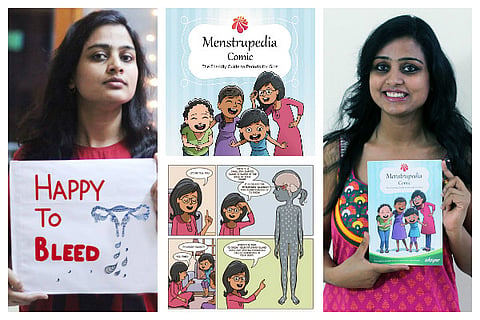

Menstrupedia, a comic book that tries to sensitize people about the idea of menstruation, has bagged the Laadli Media and Advertising Awards for the best innovative campaign on gender sensitivity.
The Laadli Media Awards, instituted in 2007, honour and recognize the efforts of people in media and advertising who highlight sensitive gender issues.
Started in March 2013, the comic book explains the biological process of menstruation and also tries to eliminate all kind of myths and taboos related to menstrual cycles.
The book revolves around four characters- Pinki, a girl who has not got her periods yet, Jia, who gets her first period during the narrative of the comic, Mira, who has already got her first period but follows restrictive customs related to menstruation and Priya didi, who guides the three girls through their process of learning about menstruation.
Calling the recognition as encouraging, Aditi Gupta, Founder of Menstrupedia, told The News Minute that they are committed to building a period positive environment for girls and that they would continue to do so whether or not they win an award.
Talking about their decision to treat the subject of menstruation in the format of a comic book, Aditi, in one of her TedX Talk says, “Most girls get their first period when they are in class 6 or 7. But most curriculums of educational institutions do not teach them about their bodies until they are in class 9. Also, the way it is taught in schools, it is explained in a purely academic fashion, without properly addressing the practical concerns related to menstruation.”
Here is the video.
Her own life experience is partly the reason why she founded Menstrupedia. Hailing from a very small town, Aditi said that she grew up using rags during her periods and even though she was curious about sanitary napkins, she did not know where to get them from, as buying a packet of sanitary pads was a shameful thing to do in her village. Owing to this mentality, she also admits that she used to believe and follow all restrictive practices related to menstruation.
However, her life started changing for the better once she joined the National Institute of Design in Ahmedabad. She started using sanitary napkins and was better informed about menstruation-related practices. Also, that is where she met her husband and co-founder of Menstrupedia, Tuhin Paul.
After undertaking extensive research on menstruation-related issues across the country, the duo found out that 3 out of 10 girls in India did not know about periods during their first cycle. And in remote villages of Rajasthan, 9 out of 10 girls were unaware about the biological process. Further, their research suggested that this is also an urban phenomenon, as opposed to the common perception of the urban populace being well-informed about the process of menstruation.
Many parents and teachers whom they met during the course of their research wanted the girls to be taught about menstruation even before their cycles started. However, due to lack of educational material related to the subject, they were hesitant about explaining it to children. The taboo nature of the subject also proved to be a stumbling block.
As communication designers, both of them wanted to develop proper communication strategies in order to eliminate the inherent shame surrounding the subject. That is when they came up with the idea of a huge pamphlet consisting of comic strips related to menstruation. They tested this prototype on teachers and students and found out that it was extremely useful for girl children, and that even boys were interested in reading it.
“Every great idea was once dismissed.” So was their idea of printing and publishing the comic books. Despite getting a good response for their prototype, they had to shelve the project due to lack of funds. “No business house believed in our idea and no one was ready to invest in it,” Aditi said. They started off by paying from their pockets but they could not sustain it for long.
This paved the way for their website www.menstrupedia.com. It includes a variety of sections like Q&A, blogs related to the subject, various illustrations and quick guides for puberty, physiology, hygiene management and menstrual myths.
Today, the website sees a traffic of more than 100,000 visitors a month, and they sell the translated versions of their books in South America, Uruguay and Nepal.
Apart from creating comic strips, they also conduct on-ground menstrual awareness workshops in villages and distribute their books free of cost in rural areas, in collaboration with various NGOs. Also, the Menstrupedia online store sells all kinds of products related to female hygiene and wellness.
When asked about the road ahead for Menstrupedia, Aditi listed out a variety of things ranging from an audio-visual comic book to finding partners for distributing their books in African countries. But amongst all this, their bigger focus is to make people period positive, and to build a nation-wide educational infrastructure for menstrual awareness.